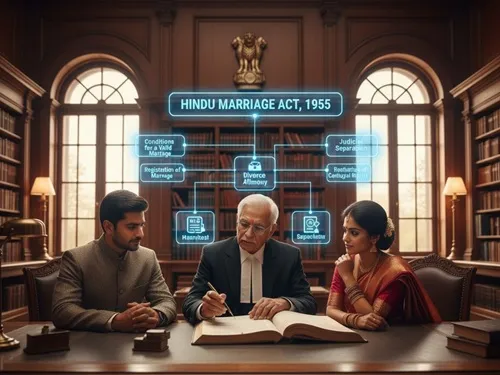Hindu Marriage Act, 1955: Explained

The Hindu Marriage Act, 1955 governs marriage and divorce among Hindus, Buddhists, Jains, and Sikhs in India. It ensures that marriages happen with free consent, proper age, and legal validity. It also provides rights related to divorce, alimony, maintenance, and child custody.
Main Rules of a Valid Hindu Marriage
| Condition | Legal Requirement |
|---|---|
| Age Limit | Groom – 21 years, Bride – 18 years |
| Consent | Both must marry with free will |
| Monogamy | Only one spouse during lifetime; bigamy is illegal |
| Prohibited Relations | Marriage not allowed between close relatives unless custom permits |
| Ceremonies | Must be performed as per Hindu customs or rituals |
| Registration | Recommended for proof (done under Hindu Marriage Act or Special Marriage Act) |
Divorce, Alimony & Custody
| Aspect | Details |
|---|---|
| Grounds for Divorce | Cruelty, adultery, desertion, mental disorder, conversion, not heard alive for 7 years, etc. |
| Mutual Consent Divorce | Both spouses agree → 6-month waiting period (can be waived by court) |
| Maintenance / Alimony | Either spouse can claim financial support based on need and income |
| Child Custody | Court decides based on child's welfare, not gender of parents |
| Remarriage | Allowed after legal divorce |
Documents Needed for Marriage Registration
- Application form (as per state rules)
- Proof of age (birth certificate, school certificate, Aadhaar)
- Proof of address (ration card, Aadhaar, voter ID)
- Photographs of the couple
- Marriage invitation card or religious ceremony proof
- Witnesses (usually 2 or 3 adults)
State-wise Marriage Registration (for Hindus)
| State / UT | Where to Apply | Website |
|---|---|---|
| Delhi | Sub-Divisional Magistrate (SDM) office | https://revenue.delhi.gov.in/revenue/marriage-registration |
| Maharashtra | Registrar of Marriages | https://aaplesarkar.mahaonline.gov.in |
| Karnataka | Registrar under Hindu Marriage Act | https://sevasindhu.karnataka.gov.in |
| Uttar Pradesh | Registrar / Tehsil Office | https://igrsup.gov.in |
| Tamil Nadu | Sub-Registrar Office | marriage registration Portal |
| Gujarat | Registrar of Marriages | https://enagar.gujarat.gov.in/DIGIGOV/ |
Hindu Marriage Act, 1955 – FAQs
-
1. Who does this Act apply to?
-
Hindus, Buddhists, Jains, and Sikhs. Not applicable to Muslims or Christians.
-
2. Is marriage registration compulsory?
-
Not everywhere, but strongly recommended as legal proof.
-
3. Can cousins marry under this Act?
-
No, unless their custom specifically allows it.
-
4. Can a Hindu marry again if the spouse is alive?
-
No. Second marriage is illegal unless the first is dissolved.
-
5. Can love marriages happen under this Act?
-
Yes, if both are Hindus.
-
6. Can a Hindu marry a non-Hindu under this Act?
-
Only if the non-Hindu converts to Hinduism before marriage.
-
7. Is a live-in relationship covered under this law?
-
Not directly, but courts have granted limited rights in long-term live-ins.
-
8. Can both partners file for divorce together?
-
Yes, through mutual consent divorce.
-
9. How long is the waiting period for mutual consent divorce?
-
6 months (the court can reduce or waive it).
-
10. Can the wife claim maintenance?
-
Yes. Based on her needs and husband's income.
-
11. Who gets child custody after divorce?
-
The court decides based on the child's welfare.
-
12. Can a marriage be cancelled?
-
Yes. If underage, forced, fraudulent, or during an existing marriage.
-
13. Can a woman remarry after divorce?
-
Yes. Both men and women can remarry legally.
-
14. Is family approval needed for marriage?
-
No. If both are adults and give free consent, it's valid.
-
15. What proof is needed for marriage?
-
Marriage certificate, photos, witnesses, and ceremony proof.
-
16. Can a court stop a Hindu marriage?
-
Yes, if it violates age, consent, or existing marriage rules.
-
17. Is dowry covered under this law?
-
No. It's banned under the Dowry Prohibition Act, 1961.
Add new comment